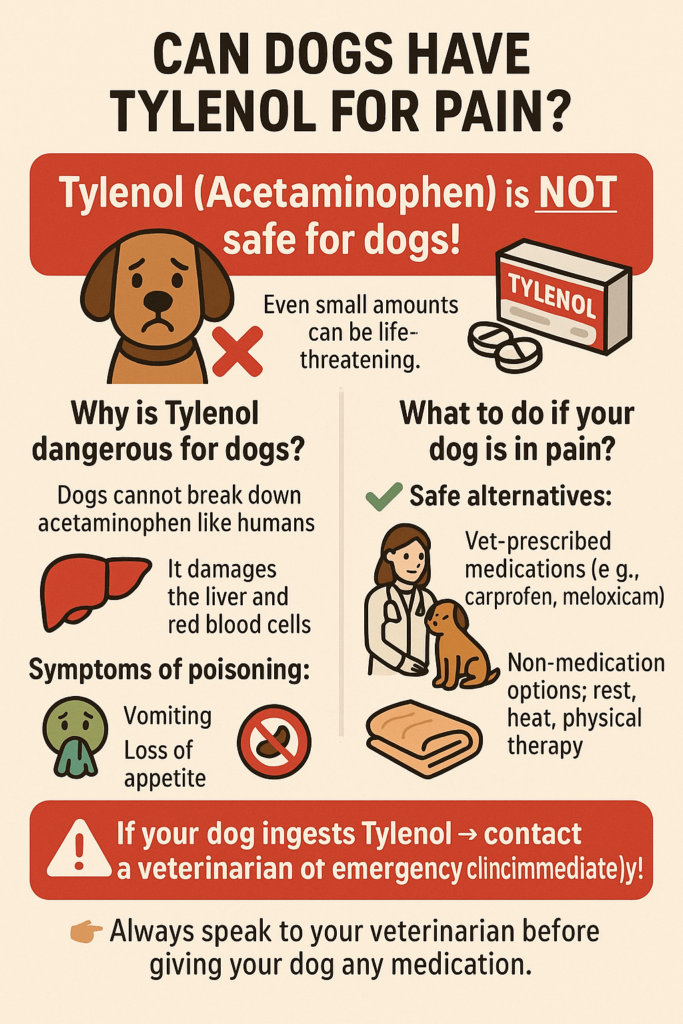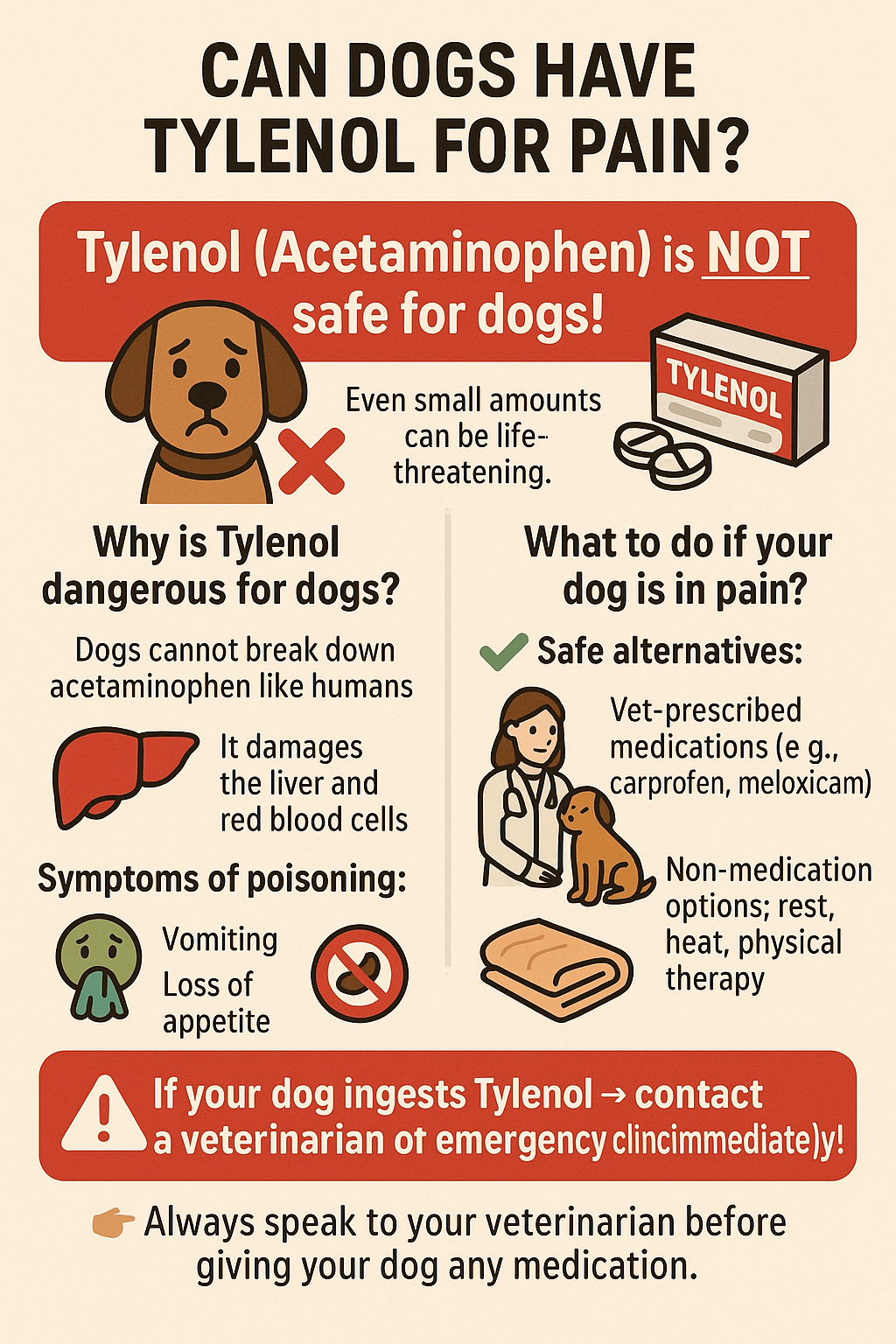Can Dogs Have Tylenol for Pain?
As a loving dog owner, it’s natural to want to alleviate your furry friend’s discomfort when they’re in pain. Over-the-counter medications like Tylenol (acetaminophen) may seem like a quick solution, but is it safe for dogs? While Tylenol is commonly used by humans to manage pain and fever, it can pose serious risks to our canine companions. Understanding the potential dangers, proper alternatives, and how to recognize signs of toxicity is crucial for ensuring your dog’s well-being. Let’s explore everything you need to know about using Tylenol for dogs and why consulting a veterinarian is always the best course of action.
Expert Opinion on Tylenol and Pain Management in Dogs
“Not only is Tylenol a risk on its own, but it’s often combined with other active ingredients that may be harmful to your pet.
Exposure to acetaminophen at toxic doses can have serious effects on a dog’s health that require prompt action and aggressive treatment by a veterinarian.”
Why Tylenol Is Dangerous for Dogs
While Tylenol is safe for humans, its active ingredient, acetaminophen, can be highly toxic to dogs. Their bodies metabolize medications differently, making even small doses potentially harmful. Here are some reasons why Tylenol should never be given to dogs without veterinary guidance.
Liver Damage:
Acetaminophen is metabolized in the liver, and dogs lack the enzymes needed to process it safely, leading to severe liver damage.Red Blood Cell Destruction:
Tylenol can cause oxidative stress, which damages red blood cells and reduces their ability to carry oxygen, resulting in breathing difficulties.Kidney Failure:
Prolonged exposure to acetaminophen can harm kidney function, especially in older or pre-existing health-compromised dogs.Gastrointestinal Issues:
Even small doses can irritate the stomach lining, causing vomiting, diarrhea, or ulcers.Lack of Safe Dosage Guidelines:
There is no universally safe dosage for dogs, as their size, breed, and health conditions vary significantly.
These risks highlight why Tylenol should never be administered without professional advice, as even minor mistakes can have life-threatening consequences.

Signs of Tylenol Toxicity in Dogs
If your dog accidentally ingests Tylenol or is given the medication unknowingly, recognizing the symptoms of toxicity can save their life. Quick action is essential to prevent further complications.
Difficulty Breathing:
Labored or rapid breathing may indicate reduced oxygen levels due to damaged red blood cells.Blue or Brown Gums:
Discolored gums are a sign of poor oxygenation and can suggest acetaminophen poisoning.Vomiting or Drooling:
Excessive drooling or vomiting is often an early symptom of gastrointestinal distress caused by the drug.Lethargy or Weakness:
Dogs may appear unusually tired or unresponsive as their body struggles to cope with the toxin.Swelling or Jaundice:
Yellowing of the skin, eyes, or gums signals liver damage, a serious complication of Tylenol toxicity.
If you notice any of these symptoms after Tylenol exposure, seek emergency veterinary care immediately to prevent irreversible harm.
Check this guide 👉Dog Pain Relief: Best 7 Expert Tips!
Check this guide 👉Understanding the Dog Pain Scale: Best 7 Expert Tips!
Check this guide 👉Dog Lower Back Pain Symptoms: Best 7 Expert Tips!
Safe Pain Management Options for Dogs | Risks of Using Human Medications |
|---|---|
Veterinarian-prescribed painkillers | Liver or kidney damage |
Natural supplements like glucosamine | Red blood cell destruction |
Physical therapy or massage | Gastrointestinal irritation |
Cold or heat therapy | Lack of safe dosage guidelines |
Weight management and diet adjustments | Potential for accidental overdose |
Safe Alternatives to Manage Your Dog’s Pain
Instead of reaching for human medications, there are safer and more effective ways to address your dog’s pain. These alternatives ensure your pet receives the care they need without risking their health.
Consult Your Veterinarian:
A vet can prescribe medications specifically formulated for dogs, such as nonsteroidal anti-inflammatory drugs (NSAIDs).Natural Remedies:
Supplements like omega-3 fatty acids, turmeric, or CBD oil (under vet supervision) can reduce inflammation naturally.Physical Therapy:
Exercises and stretches designed for dogs can improve mobility and alleviate chronic pain.Weight Management:
Maintaining a healthy weight reduces stress on joints, particularly in dogs with arthritis or joint-related pain.Comfort Measures:
Providing orthopedic beds, ramps, or regular massages can enhance your dog’s comfort and quality of life.
By exploring these options, you can provide your dog with relief while avoiding the dangers of inappropriate medications.
How to Prevent Accidental Tylenol Exposure
Preventing accidental ingestion of Tylenol is key to keeping your dog safe. Taking proactive steps ensures that your pet remains protected from harmful substances.
Store Medications Safely:
Keep all medications, including Tylenol, out of reach in secure cabinets or containers.Avoid Sharing Medications:
Never give human medications to your dog unless explicitly instructed by a veterinarian.Supervise Curious Dogs:
Monitor dogs closely if they tend to investigate countertops or trash cans where medications might be found.Educate Family Members:
Ensure everyone in your household understands the dangers of giving Tylenol to dogs.Dispose of Unused Medications Properly:
Follow local guidelines for disposing of expired or unused medications to prevent accidental access.
By implementing these precautions, you can create a safer environment for your dog and avoid potential emergencies.
Common Myths About Pain Management in Dogs
Misconceptions about pain management in dogs can lead to harmful decisions. Clearing up these myths helps ensure your pet receives the best care possible.
Myth: All Pain Relievers Are Safe for Dogs:
Many human medications, including Tylenol, are toxic to dogs and should never be used without veterinary approval.Myth: Small Doses Won’t Hurt:
Even small amounts of certain medications can cause serious harm, depending on the dog’s size and health.Myth: Natural Remedies Are Always Safe:
While some natural remedies are beneficial, others can interact negatively with existing conditions or medications.Myth: Dogs Don’t Feel Pain Like Humans Do:
Dogs experience pain just like humans, though they may express it differently through behavior changes.Myth: Pain Is Normal for Older Dogs:
Chronic pain in senior dogs should never be ignored—it can often be managed with proper treatment.
Understanding these truths empowers you to make informed decisions about your dog’s pain management.
Steps to Take If You Suspect Poisoning
If you suspect your dog has ingested Tylenol or another harmful substance, acting quickly can make all the difference. Follow these steps to ensure their safety.
Stay Calm and Act Quickly:
Panicking won’t help—focus on getting your dog the care they need as soon as possible.Call Your Veterinarian Immediately:
Provide details about what your dog ingested, how much, and when it happened.Do Not Induce Vomiting Without Guidance:
Some substances can cause additional harm if vomited improperly. Wait for professional advice.Bring Packaging or Samples:
If available, bring the medication packaging or a sample to help the vet assess the situation.Follow Treatment Instructions Carefully:
Adhere to the vet’s recommendations for treatment and follow-up care to support your dog’s recovery.
Taking these steps can minimize the impact of poisoning and give your dog the best chance at recovery.
How to Recognize Pain in Your Dog
Dogs don’t always vocalize their discomfort, so recognizing subtle signs of pain is essential for timely intervention. Look out for these behavioral and physical cues.
Changes in Appetite:
A sudden decrease or increase in eating habits may indicate underlying pain or illness.Limping or Favoring a Limb:
Reluctance to put weight on a leg suggests injury or joint pain.Excessive Licking or Chewing:
Persistent licking of a specific area could point to localized pain or irritation.Withdrawal or Aggression:
A normally social dog becoming withdrawn or snapping unexpectedly may be in pain.Restlessness or Difficulty Sleeping:
Inability to get comfortable or constant shifting positions can signal discomfort.
Noticing these signs early allows you to address your dog’s pain promptly and improve their quality of life.
Frequently Asked Questions About Tylenol and Dogs
What should I do if my dog eats Tylenol?
Contact your veterinarian or an animal poison control hotline immediately for guidance.
Are there any safe human painkillers for dogs?
No over-the-counter human medications are universally safe for dogs. Always consult a vet before administering anything.
How much Tylenol is toxic to dogs?
Even small amounts can be dangerous, depending on your dog’s size and health condition.
Can Tylenol cause long-term damage?
Yes, it can lead to permanent liver or kidney damage if not treated promptly.
What are the first signs of Tylenol poisoning?
Symptoms include difficulty breathing, blue gums, vomiting, and lethargy.
Prioritizing Your Dog’s Health and Safety
When it comes to managing your dog’s pain, safety should always come first. While Tylenol might seem like a convenient option, its potential dangers far outweigh any benefits for our canine companions. By understanding the risks, exploring safe alternatives, and taking preventive measures, you can ensure your dog receives the care they need without compromising their well-being. Remember, your veterinarian is your best resource for addressing your dog’s pain effectively and responsibly. With love, attention, and informed decisions, you can help your furry friend live a happy, healthy life.
Do Cats Have Taste Buds? Best 7 Expert Tips! – Discover how cats experience flavors and why their taste is so unique.
Do Dogs Have Taste Buds? Best 7 Expert Tips! – Discover how dogs experience taste, their preferences, and what it means for their diet and health.
Can Cats Taste Sweet? Best 7 Expert Tips! – Discover why cats can’t taste sweetness, how it affects their diet, and tips to keep them healthy and happy.
Can Dogs Taste Sweet? Best 7 Expert Tips! – Discover how dogs perceive sweetness, which foods are safe, and tips to manage their sweet cravings responsibly.





